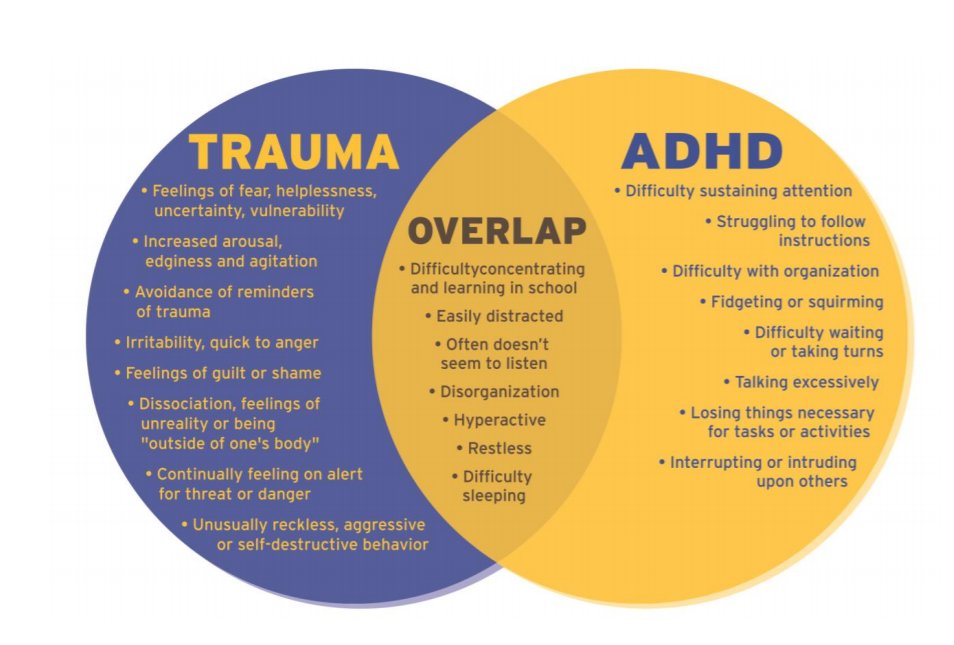
I've seen too many tweets this week claiming ADHD is actually just a trauma response, so here is a thread unpacking that assumption.
So, is ADHD actually just trauma? As far as I can tell, no. For my reasoning...keep reading. 1/16
So, is ADHD actually just trauma? As far as I can tell, no. For my reasoning...keep reading. 1/16
For starters, most scientists agree there is a strong genetic component to ADHD, which suggests that ADHD is an inherited neurological difference, rather than a condition developed in response to external factors. 2/16
However, I CAN see how people think ADHD is just a trauma response, bc they have lots of symptoms in common. This diagram from a paper I read is simplistic, but helps demonstrate how one can appear like the other, and how they can look the same from the outside. 3/16 

Maybe you’re even reading this and thinking to yourself, fuck, do I even HAVE ADHD, or am I just traumatised? This is where we need to be careful to attend to correlation and not assume causation (which the ADHD= trauma theory often does). 4/16
Research suggests that ADHDers ARE at greater risk for developing post-traumatic stress symptoms. This means that many ADHDers are ALSO impacted by trauma, which muddles how we (and researchers) differentiate between the two experiences and their interaction. 5/16
ADHDers are more likely to develop post-traumatic stress symptoms for a few reasons. For one, we're more sensitive to all stimulation, including negative experiences, which means that something that a neurotypical person could bounce back from might traumatise us. 6/16
And, we're more likely to get into traumatising situations. Our impulsivity means we sometimes miss danger cues. ADHDers are also overrpresented in poor communities (bc ableism makes it hard to build stability when you're an ADHDer), which have higher rates of stress. 7/16
So my take is that ADHD puts you at risk of trauma, rather than the inverse. The logic of "ADHD is all a trauma response" is faulty, and assumes causation where it is likely correlation.
But as well as probably being wrong, I also think this theory is dangerous, because:
8/16
But as well as probably being wrong, I also think this theory is dangerous, because:
8/16
It frames ADHD as something that’s solely caused by the environment around a person (i.e the trauma), which supports the “ADHD is actually from bad parenting” narrative that dominates mainstream understandings of ADHD. 9/16
We already know that Black and Indigenous people are underdiagnosed when it comes to ADHD, and that they’re more likely than others to be slapped with the labels of “naughty” “irresponsible” and “aggressive”, and punished for their behaviour, both as children and as adults 10/16
We also already know that Black and Indigenous parents are more heavily surveilled than other parents. Viewing ADHD a behavioural response to the actions of others gives the State more justification to police these groups, rather than support them. 11/16
This is why I think it’s important to push against understanding ADHD solely by the presence of visible negative symptoms. When we define ADHD as a brain disorder characterised by impulsivity, hyperactivity and an inability to focus, ADHD does look a lot like trauma. 12/16
But, when we understand it as a neurodivergence, that, with the right accommodations, also comes with creativity, innovation, and critical thinking, this mistake is harder to make. 13/16
Those of you who follow me know that I think it’s very important to analyse how ADHD is understood and pathologized. But, the neurological difference that "ADHD" aims to diagnose is still real. It serves nobody to claim otherwise. 14/16
So yeah, I'd appreciate less "ADHD is just a trauma response to capitalism" and the "ADHD isn't real, it's all pathologisation" takes. There are important and interesting conversations to have about pathologisation, but I'm not convinced this is one of them. 15/16
Saying it’s all trauma is pretty much shorthand for saying that in a better world, ADHDers wouldn’t exist. I don’t want that world. Give me a reimagined universe where ADHDers are accommodated to fully flourish WITHOUT trauma, over one without ADHDers any day. 16/16
A disclaimer: I’m by no means an expert on the causes behind ADHD. I used the following sources to think this through, but as always- take what I say with a hefty dose of your own critical thinking ♥️
theatlantic.com/health/archive…
nctsn.org/sites/default/…
link.springer.com/article/10.100…
ncbi.nlm.nih.gov/pmc/articles/P…
ncbi.nlm.nih.gov/pmc/articles/P…
additudemag.com/current-resear…
acamh.onlinelibrary.wiley.com/doi/full/10.11…
nctsn.org/sites/default/…
link.springer.com/article/10.100…
ncbi.nlm.nih.gov/pmc/articles/P…
ncbi.nlm.nih.gov/pmc/articles/P…
additudemag.com/current-resear…
acamh.onlinelibrary.wiley.com/doi/full/10.11…
P.S. Many of these sources are ableist in their aim, intent, and interpretations. For many of them I drew on their results, rather than their findings or analysis.
• • •
Missing some Tweet in this thread? You can try to
force a refresh


